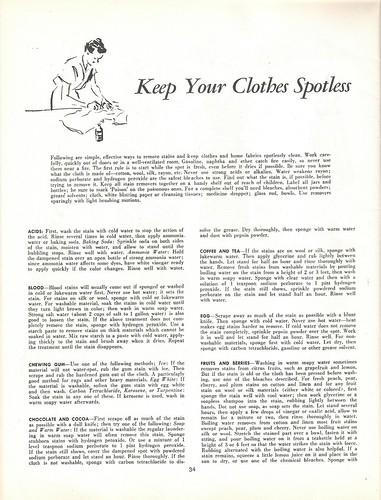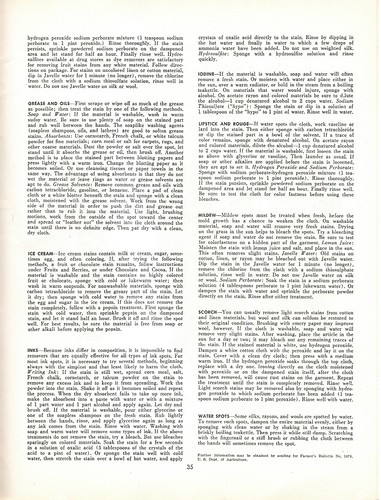Here are some helpful suggestions for stain removal from
Fashion: Fall-Winter 1950.
“Following are simple,
effective ways to remove stains and keep clothes and home fabrics spotlessly
clean. Work carefully, quickly out of doors
or in a well-ventilated room. Gasoline,
naphtha and ether catch fire easily, so never use them near a fire. The first rule is to start while the spot is
fresh, even before it dries if possible.
Be sure you know what the cloth is made of – cotton, wool, silk, rayon,
etc. Never use strong acids or
alkalies. Water weakens rayon; sodium
perborate and hydrogen peroxide are the safest bleaches to use. Find out what the stain is, if possible,
before trying to remove it. Keep all
stain removers together on a handy shelf out of reach of children. Label all jars and bottles; be sure to mark
‘Poison’ on the poisonous ones. For a
complete shelf you’ll need bleaches, absorbent powders; grease solvents; cloth,
white blotting paper or cleansing tissues; medicine dropper; glass rod,
bowls. Use removers sparingly with light
brushing motions.”
I am not sure what to think of applying kerosene or
turpentine to any of my clothes in an effort to remove something as benign as
gum! "Use sparingly" - you got that right! And which is worse: grease stains or gasoline and benzene. Seriously – who has benzene in their home!?!
Although, to be fair, I have no idea what most of the scary-sounding ingredients
in any standard household cleaner actually do - which is also disturbing, come to think of it. So perhaps gasoline, kerosene, and benzene
are mild in comparison to what we use today? Any chemistry majors
out there? Because it seems to me that some of these helpful suggestions are just as likely to burn right through the fabric rather than remove a stain. I guess dissolving fabric is one way to remove that pesky mark from your favorite frock!
I think I will just stick with the old-fashioned soap and water route!
[Vintage adverts & photos source]






More dangerous than what we have today actually, Benzene is a known human carcinogen so it's been out of household products for quite a while now thank goodness.
ReplyDeleteA gal who knows a bio-hazard, and is grateful for the greater good - it could only be you Phyllis!
DeleteSABLE (in unexpected places)!
There's a natural stain remover that I use for my handmade things, its called "Buncha Farmers Stain Remover". It works great for me!
ReplyDeleteI don't know what kind of chemicals lurk in OxiClean, but I will take that any day over dousing my clothes in gasoline. :]
ReplyDeleteKerosene is still sometimes used as a spot remover in other less safety conscious countries (think India and silk garments.) No, benzene and these compounds are unlikely to "burn" through most natural fibers. Benzene is not an acid (like vinegar) or a strong base (like lye), nor is it a reactive oxidizer like bleach. Benzene only contains carbon and hydrogen and other compounds containing primarily carbon and hydrogen (like many oils and grease. These are termed "hydrocarbons" or "organic compounds" in chemistry) will tend to dissolve in it. So you could rinse oil spots out of a fabric with benzene and then the remaining benzene on the fabric would evaporate off. Fabrics like cotton would not dissolve however- too many polar groups (groups of atoms that have partial positive or negative electric charges on them, for example hydroxyl OH- groups or amine groups ), and large cross-linked polymers. Generally you can no longer purchase these compounds for home use, however they were available in the past before their risks were known.
ReplyDeleteYes the cleaners you purchase now are fairly safe in terms of cancer-causing potential and potential to cause birth-defects, although there still may be long term negative environmental effects for some detergents. They also clean by a different mechanism so they can remove spots that chemicals like benzene would be unable to remove.
Please keep in mind however that the safety of a compound has nothing to do with whether it has a scary sounding chemical name (the nomenclature is there to unambiguously identify the compound, kind of like using the Latin genus/species name for a flower instead of its familiar name.) and nothing to do with whether or not the compound was synthesized in a lab or is naturally derived. There are many natural plant-based cyclic aromatic compounds like benzene that are also carcinogens. And when a "natural" molecule can be synthesized in the lab, there is no difference in the properties of the two purified compounds. Sometimes lab synthesis of a compound actually reduces environmental impact when a naturally-derived compound would require intensive agriculture and loss of natural habitat. When in doubt about handling risks, look for a MSDS (materials safety data sheet) online.
If you want to understand the basic concepts-solubility, concentration, rate of reaction, acidity, polarity, types of reactions, organic/inorganic compounds- related to the chemicals in household items, you can learn this in most introductory chemistry courses. It will help keep you from getting scammed by improbable "miracle" products and help you better assess safety risks. If you can't formally take a course, MIT's open courseware program offers many lectures, classroom readings, syllabi, assignments, and resources online for free.
Petroleum solvents such as kerosene also predate modern dry cleaning chemicals (these are chlorinated solvents)!
ReplyDeleteSoap and water for me, too, please! I have crazy sensitive skin and can only use unscented, specialty laundry detergents - I can just imagine (yikes!) what my skin would think of these kinds of harsh chemicals.
ReplyDelete♥ Jessica
I hate all the icky chemicals, even it today's products. Baking soda and vinegar are awesome natural ways to get stains out.
ReplyDeleteLux Flakes are my go to laundry product, very little can resist a soak in Lux and warm water. It also keeps grubby teenage boy school shirts looking pristine (for the first five minutes they've got them on anyway!).
ReplyDelete